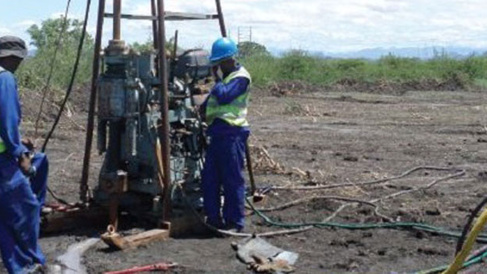The project
Now in its second year, Wind Africa is a collaborative project which aims to support the potential of renewable energy resources to generate power across the continent and is funded by the Engineering and Physical Sciences Research Council (EPSRC). Approximately half of Africa’s population lacks access to electricity and more power generation is also needed to meet future demand. It is estimated that 35 per cent of the world’s resources for wind energy could be located in the continent, but there are several challenges to developing the necessary infrastructure. Arid conditions result in unsaturated soil, mostly expansive clay, which makes founding wind turbines difficult. The soil properties change throughout the seasons and with variations in moisture content; surfaces heave in the wet season and shrink in the dry season. These cycles can cause significant damage to buildings founded on these soils.
The aim of the Wind Africa project is to develop a set of design guidelines for piled wind turbine foundations in expansive clay to support growth of a sustainable energy market in Africa. There are four work packages to the project:
- To perform field tests on the cyclic response of foundations on unsaturated expansive soils
- To complement the field testing with centrifuge tests
- To perform an extensive laboratory study on samples of soils taken from expansive soil regions in Africa
- To develop a numerical analysis code to allow detailed studies to be performed on foundations with various geometries and configurations.
The first and third packages are being undertaken by researchers in Cambridge, led by Dr Mohammed Elshafie, CSIC Investigator and Senior Lecturer for the Laing O’Rourke Centre for Construction Engineering and Technology. The second and fourth packages of the project are being investigated by collaborators at the University of Pretoria and Durham University respectively.
Field testing in South Africa
In January, a geotechnical drilling investigation took place on the proposed field-testing site in South Africa. The site was chosen as there is evidence of problems with structures, which can be seen in the cracks of nearby buildings. It is also a large open area of known expansive clay with a lack of current infrastructure that would be impacted by testing.
Two boreholes were drilled to investigate the profile of the soil and samples were taken for laboratory testing. Rock was found at an approximate depth of 12m in both boreholes and slickensided material, which is evidence of expansive soil, was found throughout the profile until the transition to rock. Undisturbed soils were also taken from the boreholes for the laboratory testing in Cambridge.
Three types of testing were carried out on the soil samples; water retention, oedometer and triaxial tests to determine the moisture characteristics, stiffness and strength of the soil respectively. The samples were characterised and were found to have a high percentage of clay and a low percentage of gravel. The change in the volumes of the samples was measured during wetting and drying cycles and shrinkages recorded. Swelling tests under different stress levels are still to be undertaken and mineralogical composition investigated.
Planning is now under way for the installation of the piles for the full field testing programme.
"We are at an exciting stage of the project with the first part of the drilling completed. The design guidelines we are working towards will aid geotechnical engineers to select the most appropriate foundation solution to suit unsaturated expansive soil conditions subject to extreme weather conditions." Dr Mohammed Elshafie, CSIC Investigator and Senior Lecturer in Construction Engineering for the Laing O’Rourke Centre for Construction Engineering and Technology
Contact: Dr Mohammed Elshafie
Team: Dr Talia Da Silva and Dr Khalid Alhaj Abdalla, Laing O'Rourke Centre Research Associates, Dr Mohammed Elshafie, Dr Giovanna Biscontin

